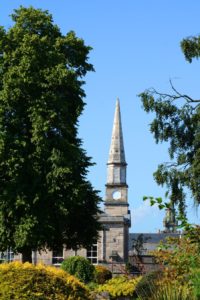A New Jersey federal district judge recently rejected North Jersey Vineyard Church’s request for injunctive relief, which would have required the Township of South Hackensack to approve the church’s site plan application. The court’s decision is the latest in a series of legal disputes between the two parties. 
Facts of the Case
Plaintiff North Jersey Vineyard Church (“the Church”) filed suit against the Township of South Hackensack and its Planning Board (collectively, the “Defendants”) alleging violations of its First and Fourth Amendment rights under the United States and New Jersey Constitution and violation of the Religious Land Use and Institutionalized Persons Act.
As detailed in court documents, the Church purchased a property at 310 Phillips Avenue in South Hackensack (the “Phillips Property”) in March 2014 to use for its services. Because the Phillips Property was zoned for mixed use and did not allow for houses of worship, the Church submitted an application for a variance, which included a traffic impact analysis, a planning report, and an engineer’s report. After the Zoning Board of Adjustment unanimously denied the application, the Church filed suit against the Township, alleging a variety of claims including a facial challenge of the Township’s Zoning Code. The parties reached a settlement under which the Township allegedly agreed to amend the zoning code to allow houses of worship in mixed use districts and agreed that the existing parking lot was sufficient for the building. Based on this settlement, the Church states that it concluded its purchase of the Phillips Property.
To complete the project, the Church applied for Site Plan approval from the Township Planning Board. Prior to this hearing, the Township Planner informed the Church that, while it met the parking requirements for the sanctuary, it was deficient 116 spaces for non-sanctuary space, since it needed to provide one spot per 200 square feet for such purposes. The date for reconvening was rescheduled by the Township Planning Board, and the Church alleges that during this time it was apprised that the Township was seeking to re-develop a number of areas, including the Phillips Property. The Township allegedly passed a resolution authorizing a preliminary investigation of proposed areas for re-development on September 10, 2015. After the Township Planning Board reconvened, it voted to deny the Church’s Site Plan, allegedly without providing any information or reason for the denial.
The Church filed suit, seeking a reversal of the Township Planning Board’s decision and monetary damages. It also sought injunctive relief requiring the Township to approve its site plan application.
The Court’s Decision
The federal district court denied the Church’s motion for injunctive relief. As noted by the court, in order to obtain injunctive relief, the Church was required to demonstrate both a likelihood of success on the merits and the probability of irreparable harm if relief is not granted.
The Court rejected both of the Church’s arguments for irrefutable harm. With regard to the argument that it would suffer a loss of First Amendment freedoms in the interim, the court held:
Here, the Church’s First Amendment freedoms are not chilled. The Church continues to have use of the Teterboro Property to conduct its religious services. In addition, the parking issue that lies at the heart of this dispute does not directly penalize the Church’s First Amendment right, but instead only incidentally inhibits it—if at all. As such, the Court finds that the Church’s cursory assertions of a chilling effect on its right to worship fails to show irreparable harm to justify the relief sought.
The court also rejected the Church’s argument that its property rights would be harmed in such a way that it could not be compensated through damages. In reaching its decision, the court noted that the Church’s argument hinged on a resolution by the Township from September 2015, authorizing a preliminary investigation of particular areas for redevelopment and, accordingly, did not pose an immediate threat of harm.
“The Township Resolution calling for a preliminary investigation fails to amount to an imminent or presently existing threat necessitating injunctive relief,” the court held. “Consequently, the Court finds that the Church has not established harm to its property rights sufficient to warrant a preliminary injunction.”
For more information about the district court’s decision or the legal issues involved, we encourage you to contact a member of Scarinci Hollenbeck’s Government Law Group.
